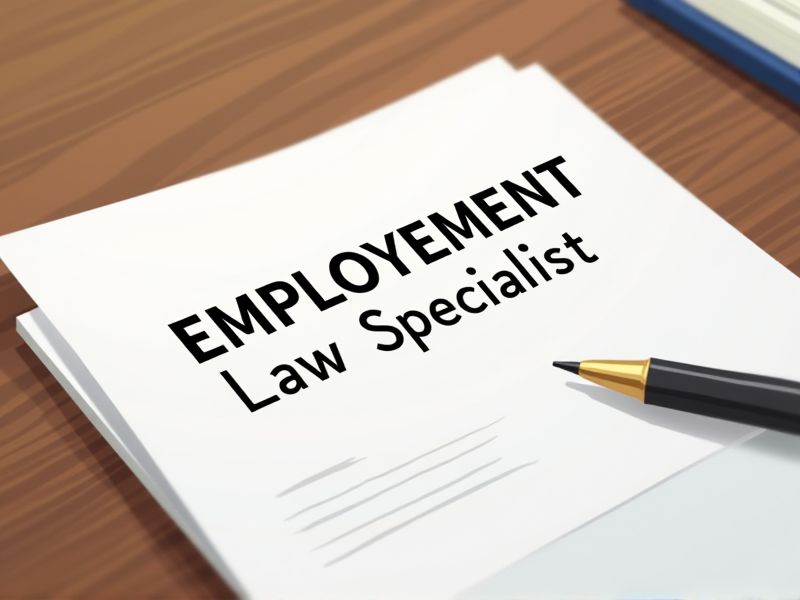
Employment law specialists navigate a complex landscape of regulations and legal frameworks designed to protect both employees and employers. Expertise in this field requires not only a detailed understanding of the laws but also the ability to apply this knowledge in diverse workplace scenarios. Certain certifications provide an official recognition of proficiency, offering assurance to clients and employers about the specialist's capability and knowledge base. Here are some important certifications you may need as an Employment Law Specialist.
Certified Employment Law Specialist (CELS)
Certified Employment Law Specialist (CELS) designation ensures proficiency in complex employment law, leading to better client representation. The certification process exposes specialists to updated legal standards, thus bridging knowledge gaps. Employers and clients gain greater confidence in the skills of certified professionals, mitigating legal risks. In competitive legal markets, CELS provides a distinct professional advantage by demonstrating commitment to excellence.
SHRM Certified Professional (SHRM-CP)
An SHRM Certified Professional (SHRM-CP) demonstrates a comprehensive understanding of human resources principles, crucial for navigating complex employment laws. This certification ensures a specialist can implement HR strategies that comply with legal requirements, reducing company liability. Employers value SHRM-CP credentials as they indicate a professional's ability to effectively handle sensitive workplace issues. Continuous professional development through SHRM-CP keeps specialists updated on evolving laws and practices, enhancing organizational risk management.
SHRM Senior Certified Professional (SHRM-SCP)
SHRM-SCP demonstrates advanced HR competencies, which are crucial for understanding and applying complex employment laws. Holding this certification often correlates with greater credibility in legal and compliance matters. Employers tend to favor candidates with SHRM-SCP credentials for specialist roles because it signifies a mastery of strategic HR skills. In-depth knowledge of regulatory changes becomes pivotal, and SHRM-SCP certification ensures updated proficiency in this area.
Professional in Human Resources (PHR)
Professionals in Human Resources (PHR) possess a comprehensive understanding of employment law, which helps businesses comply with regulations, thus avoiding costly legal disputes. Their expertise in managing employee relations ensures that companies maintain fair and nondiscriminatory workplace practices. They help design and implement policies aligned with current labor laws that protect both the organization and its employees. PHR professionals continuously monitor changes in legislation, ensuring that the company's HR practices remain up-to-date and legally sound.
Senior Professional in Human Resources (SPHR)
Having an SPHR certification equips an Employment Law Specialist with advanced knowledge of employment law and compliance, reducing legal risks for organizations. Possessing this credential signals a deep understanding of strategic HR management, enhancing the ability to align employment practices with business objectives. The certification demonstrates expertise in navigating complex legal frameworks, ensuring workplace policies adhere to current regulations. Employers value SPHR-certified professionals for their ability to proactively address legal issues, improving organizational resilience and credibility.
Certified Employee Benefit Specialist (CEBS)
Certifications such as the Certified Employee Benefit Specialist (CEBS) provide an in-depth understanding of complex benefit programs, which Employment Law Specialists frequently encounter. Expertise in employee benefits allows legal professionals to navigate regulations effectively, reducing compliance risks. Knowledge of these benefits assists in drafting policies and contracts that align with legal standards, promoting efficient human resource management. Employers often rely on specialists with CEBS certification to mitigate litigation risks related to benefit disputes, contributing to enhanced workplace stability.
Equal Employment Opportunity (EEO) Compliance Certification
Equal Employment Opportunity (EEO) Compliance Certification ensures that an Employment Law Specialist is well-versed in federal and state regulations designed to prevent workplace discrimination. A specialist with this certification can effectively advise organizations on creating inclusive hiring practices. Without the certification, a specialist might lack the necessary credentials to navigate complex EEO compliance issues. The certification demonstrates a commitment to upholding ethical standards in employment law.
Certified Workplace Investigator (CWI)
Employment law specialists deal with complex workplace issues, and a Certified Workplace Investigator (CWI) possesses the specialized training to thoroughly investigate such matters. CWI credentials ensure that investigations are conducted impartially, reducing potential legal liabilities for organizations. A CWI's expertise helps gather factual evidence, supporting the legal processes handled by employment law specialists. Employers benefit from accurate and reliable findings, aiding law professionals in making informed decisions about workplace disputes.
Labor Relations Certification (LRC)
Labor Relations Certification enhances an employment law specialist's understanding of labor laws and regulations. This certification provides expertise in navigating complex negotiations between employers and unions. Mastery of labor relations boosts credibility and effectiveness in advising organizations on compliance issues. It acts as a critical differentiator in a competitive job market, leading to increased career opportunities.
Compliance and Ethics Professional (CCEP)
The presence of a Compliance and Ethics Professional helps ensure that an Employment Law Specialist operates within legal frameworks, reducing the risk of costly lawsuits and penalties. When a CCEP is involved, organizations often experience enhanced trust among employees, fostering a culture of transparency and fairness. Organizations that integrate a CCEP into their team can improve their reputation, which in turn attracts top talent who value ethical business practices. A CCEP provides specialized training to an Employment Law Specialist, equipping them with the skills to effectively navigate complex ethical dilemmas and compliance challenges.
Summary
You, as an Employment Law Specialist, can expect enhanced credibility and trust from clients after obtaining certifications. Certifications typically lead to increased knowledge, equipping you with updated legal skills and insights. This specialized knowledge may increase your professional opportunities and earning potential. Employers and clients often prefer individuals with certifications, influencing their choice in hiring or consulting you over others.
